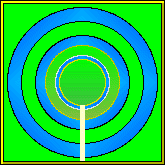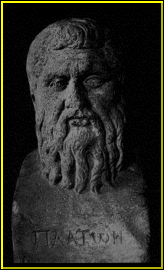
Written by Bradley Keyes
| |
||
Pre-reading Discussion
1) What is Atlantis and how much do you know about it?
2) Do you believe that Atlantis is made up? Why or why not?
 Atlantis
- Fact, Fiction or Exaggeration?
Atlantis
- Fact, Fiction or Exaggeration? The
story of Atlantis begins quite literally with two of Plato's
dialogues, Timaeus and Critias. These
accounts are
the only known written records which refer
specifically to a lost civilization
called Atlantis.1
Many people believe the tale to be complete fiction,
the creation of a philosopher's imagination used to illustrate
an argument. Others believe that the story was inspired
by events which may have destroyed
the Minoan civilization on Crete and Thera. Still others maintain
that the story is an accurate representation
of a long lost and almost completely forgotten land.
| |
Plato was a student of Socrates until the latter's death in 399 BC at the hands of the Athenian authorities. After his teacher's death, Plato traveled extensively, including journeys in Egypt. Greek philosopher - 427-347 B.C.
Note: Dates are approximate, there is some uncertainty as to his birth and deathIn 387 BC he returned to Athens and founded the Academy, a school of science and philosophy, that became the model for the modern university.2 Perhaps the most famous student of the Academy was Aristotle whose teachings have had tremendous impact on philosophy through today.
Due to the Academy's safekeeping, many of Plato's works have survived. His extant writings are in the form of letters and dialogues, the most famous of which is probably The Republic.3 His writings cover subjects ranging from knowledge to happiness to politics to nature.
Two of his dialogues, Timeaus and Critias, hold the only known original references to the island of Atlantis.
Click here for information about sites where you can find out more about Plato and where you can obtain copies of all of his works.
Timaeus and Critias, two of Plato's dialogues, are the only existing written records which specifically refer to Atlantis. The dialogues are conversations between Socrates, Hermocrates, Timeaus, and Critias. Apparently in response to a prior talk by Socrates about ideal societies, Timeaus and Critias agree to entertain Socrates with a tale that is "not a fiction but a true story."4 The dialogues that follow were written by Plato some time around 360 BC and are English translations by Benjamin Jowett: |
Cast of Characters
Note: There are 2 people named Critias related to the story of Atlantis and this can lead to some confusion. There is the Critias who actually takes part in the dialogues. He is the one who tells the story of Atlantis to Socrates. Then there is Critias who was the grandfather of the Critias of the dialogues. This elder Critias told the story of Atlantis to his grandson, Critias, who then conveyed the story to Socrates in the dialogues.
Those who actually take part in the dialogues:Those mentioned in the dialogues:Timaeus - there is no historical record of him. Critias - Plato's great grandfather. Socrates - Plato's mentor and teacher. He was condemned to death by authorities in Athens for "corrupting the moral of Athenian youth"; He lived from 469 to 399 BC. Hermocrates - statesman and soldier from Syracuse. Solon - Athenian traveler, poet, and lawgiver who lived from approximately 638-559 BC. According to Plato it was he who learned of the story of Atlantis from an Egyptian priest. Dropides - Critias' great grandfather who was told the story of Atlantis by Solon, a distant relative and close friend.
Critias - Son of Dropides and grandfather of the Critias who takes part in the dialogues. It was he who related the story of Atlantis to the Critias of the dialogues.
Reference
- Mediagraphy - lists and reviews of books, magazines, videos, etc. on Atlantis and related topics
- Links - lists and reviews of on-line sources of information about Atlantis and related topics
- Contacts - people and organizations involved with Atlantis and related topics
Timeline
- 9000 BC - Cataclysm destroys Atlantis (based on Plato's writings)
- 1500 BC - Volcanic eruption destroys Thera and possibly brings an end to the Minoan civilization
- 360 BC - Plato writes Timaeus and Critias
- 1882 - Atlantis - The Antediluvian World by Ignatius Donnelly is released
- 1924 - The Problem of Atlantis by Lewis Spence is released
- 1960 - A. G. Galanopoulos discoveries the ruins of ancient cities on Thera
1968 - The Bimini Wall is discovered
| |
http://www.activemind.com/Mysterious/Topics/Atlantis
prepared by Active Mind.
After reading discussion
1) Now that you've read about Atlantis, describe the theories of Atlantis. Do you believe that it is fact, fiction, or exaggeration and why?
2) What are Timaeus and Critias? What do they say or do to support the existence of Atlantis?
